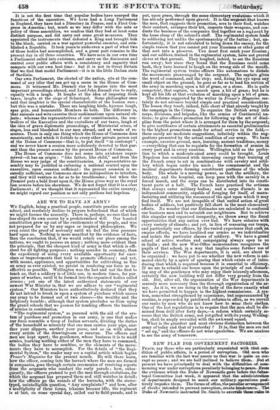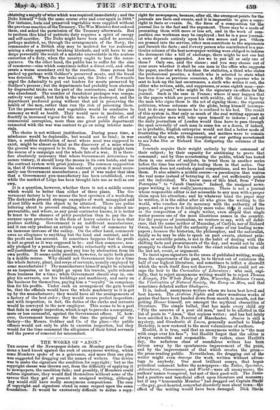NEW PLAN FOR GOVERNMENT FACTORIES.
PEACE, say those who are particularly acquainted with that con- dition of public affairs, is a period of corruption. Old men who are familiar with the last war assure us that war is quite as cor- rupt as peace ; and we are half inclined to believe them. But at present we have principally to deal with the difficulties of com- mencing war under corruptions peculiarly belonging to peace. From the evidence which the Duke of Newcastle gave before the Sebas- topol Committee last week, it appeared that the administration of departments designed to assist our military operations posi- tively impedes them. The forms of office, the peculiar arrangement of cheeks intended to prevent corruption, create hinderance. The Duke of Newcastle instructed Dr. Smith. to override those rules in
obtaining a supply of wine which was required immediately ; and the Duke himself "took the same course over and over again in 18M." For instance, huts and preserved vegetables were supplied without the previous sanction of the Treasury. The War Minister first ordered them, and asked the permission of the Treasury afterwards. But to perform this kind of patriotic duty requires a spirit of energy and self-sacrifice. The Duke might have been called to account, perhaps mulcted, as, through the arrangements of the Navy, the commander of a British ship may be mulcted for too zealously seizing a ship apparently breaking blockade, and will have to un- dergo personally the result of a mistake unavoidable in the zealous execution of a duty, when the country ought to bear the conse- quences. On the other hand, the public has to suffer for the sins of commerce—sins which sometimes inflict a direct evil, and often create a worse secondary evil by the reaction. Some person had peeked up garbage with Goldner's preserved meats, and the fraud was detected. When the war broke out, the Duke of Newcastle urged the Admiralty to put out tenders for meats preserved by Goldner's process ; but the departments had probably been alarmed by disgraceful tricks on the part of the contractors, and the plan was abandoned. The number of fraudulent packages was compa- ratively very small, but faith in the whole was destroyed, and the department preferred going without that aid in preserving the health of the men, rather than run the risk of poisoning them. Yet the preserved meats and vegetables would be conducive to economy as well as health. They would save in medicine, and fructify in increased vigour for the men. To avoid the effect of commercial corruption, more than one great public department connected with the war was content to go on using inferior mate- rials.
The choice is not without justification. During peace time, a mischance would be deplorable, but would not be fatal ; in war time, a sudden destitution of meat where meat was supposed to exist, might be almost as fatal as the discovery of a mine where the ground was supposed to be firm. One such defeat might turn the course of a campaign and the whole fate of a war. It is there- fore absolutely necessary that where Government determines to secure victory, it should keep the means in its own heeds, and use the contract system with great jealousy. The common supposition is, that if Government disuses the contract system it must neces- sarily use Government manufactures ; and it was under that ides. that a Government gun-manufactory has been established, even while the market of Liege has been brought into use as well as our own.
It is a question, however, whether there is not a middle course which would be better than either of these plans. The Go- vernment factory is by no means the best specimen of a workshop. The 'dockyards present strange examples of work misapplied and of cost little worth the object to be attained. There are police loitering about to prevent stealing, where stealing is almost un- preventable, and where, as any great contractor knows, it is better to trust to the chances of petty peculation than to pay the in- surance upon protection in the form of heavy salaries to men that produce nothing. Government is an indifferent manufacturer, and it can only produce an article equal to that of commerce by an immense increase of the outlay. On the other hand, commerce owes no allegiance to anything but the bond and contract, and to the profit and loss account. It sometimes happens that the profit is not so great as it was supposed to be ; and then commerce, usu- ally pledged by a penalty-clause, works reluctantly with a strong self-justification for making good any loss by abstraction from its own profits. It seems quite possible, however, to unite both plans in a middle course. Why should not Government hire for a time the whole factory, plant, and corps of servants, usually employed by some manufacturer ? The manufacturer himself might be retained as an inspector, or he might go upon his travels, quite released from business for a time ; while Government should step in, em- ploy his servants, use his buildings and machinery, and carry on the business for themselves, paying him a "royalty" in compensa- tion for his profits. Under such an arrangement the gain would be, that the officials would have the whole machinery as it is got up by the manufacturer; they would have all the arrangements of a factory of the best order ; they would secure perfect inspection; and with inspection, in fact the duties of the clerks and servants would be conveyed to the new employer. This seems to be a part that fails in simple inspection, which is apt to provoke a conspiracy, more or less successful, against the Government officer. If, how- ever, Government became for the time the principal of the factory—the Messrs. Goldner and Co. of the place—the public officers would not only be able to exercise inspection, but they would for the time command the allegiance of their hired servants and the power of removal for misconduct,



































 Previous page
Previous page